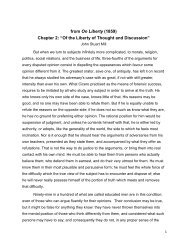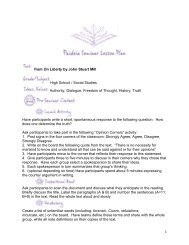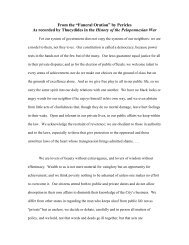Rousseau_contrat-social
You also want an ePaper? Increase the reach of your titles
YUMPU automatically turns print PDFs into web optimized ePapers that Google loves.
leads. But I feel my heart protesting and restraining my pen; let us<br />
leave these questions to the just man who has never offended, and would<br />
himself stand in no need of pardon.<br />
6. LAW<br />
BY the <strong>social</strong> compact we have given the body politic existence and life;<br />
we have now by legislation to give it movement and will. For the<br />
original act by which the body is formed and united still in no respect<br />
determines what it ought to do for its preservation.<br />
What is well and in conformity with order is so by the nature of things<br />
and independently of human conventions. All justice comes from God, who<br />
is its sole source; but if we knew how to receive so high an<br />
inspiration, we should need neither government nor laws. Doubtless,<br />
there is a universal justice emanating from reason alone; but this<br />
justice, to be admitted among us, must be mutual. Humanly speaking, in<br />
default of natural sanctions, the laws of justice are ineffective among<br />
men: they merely make for the good of the wicked and the undoing of the<br />
just, when the just man observes them towards everybody and nobody<br />
observes them towards him. Conventions and laws are therefore needed to<br />
join rights to duties and refer justice to its object. In the state of<br />
nature, where everything is common, I owe nothing to him whom I have<br />
promised nothing; I recognise as belonging to others only what is of no<br />
use to me. In the state of society all rights are fixed by law, and the<br />
case becomes different.<br />
But what, after all, is a law? As long as we remain satisfied with<br />
attaching purely metaphysical ideas to the word, we shall go on arguing<br />
without arriving at an understanding; and when we have defined a law of<br />
nature, we shall be no nearer the definition of a law of the State.<br />
I have already said that there can be no general will directed to a<br />
particular object. Such an object must be either within or outside the<br />
State. If outside, a will which is alien to it cannot be, in relation to<br />
it, general; if within, it is part of the State, and in that case there<br />
arises a relation between whole and part which makes them two separate<br />
27











